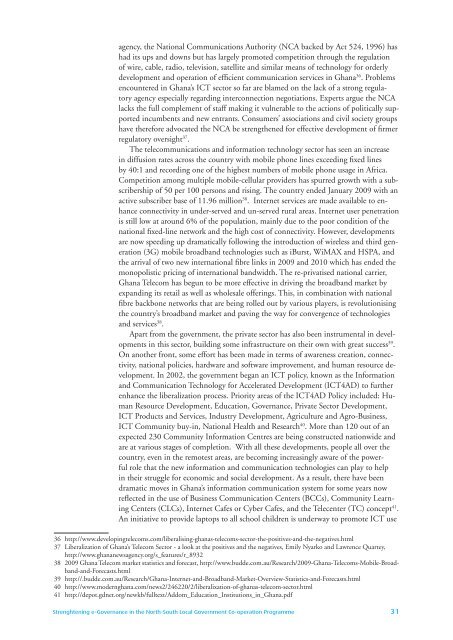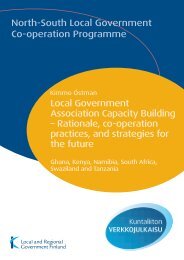E-READINESS QUESTIONNAIRE FOR NORTH ... - Kunnat.net
E-READINESS QUESTIONNAIRE FOR NORTH ... - Kunnat.net
E-READINESS QUESTIONNAIRE FOR NORTH ... - Kunnat.net
Create successful ePaper yourself
Turn your PDF publications into a flip-book with our unique Google optimized e-Paper software.
agency, the National Communications Authority (NCA backed by Act 524, 1996) has<br />
had its ups and downs but has largely promoted competition through the regulation<br />
of wire, cable, radio, television, satellite and similar means of technology for orderly<br />
development and operation of effi cient communication services in Ghana 36 . Problems<br />
encountered in Ghana’s ICT sector so far are blamed on the lack of a strong regulatory<br />
agency especially regarding interconnection negotiations. Experts argue the NCA<br />
lacks the full complement of staff making it vulnerable to the actions of politically supported<br />
incumbents and new entrants. Consumers’ associations and civil society groups<br />
have therefore advocated the NCA be strengthened for effective development of fi rmer<br />
regulatory oversight 37 .<br />
The telecommunications and information technology sector has seen an increase<br />
in diffusion rates across the country with mobile phone lines exceeding fi xed lines<br />
by 40:1 and recording one of the highest numbers of mobile phone usage in Africa.<br />
Competition among multiple mobile-cellular providers has spurred growth with a subscribership<br />
of 50 per 100 persons and rising. The country ended January 2009 with an<br />
active subscriber base of 11.96 million 38 . Inter<strong>net</strong> services are made available to enhance<br />
connectivity in under-served and un-served rural areas. Inter<strong>net</strong> user pe<strong>net</strong>ration<br />
is still low at around 6% of the population, mainly due to the poor condition of the<br />
national fi xed-line <strong>net</strong>work and the high cost of connectivity. However, developments<br />
are now speeding up dramatically following the introduction of wireless and third generation<br />
(3G) mobile broadband technologies such as iBurst, WiMAX and HSPA, and<br />
the arrival of two new international fi bre links in 2009 and 2010 which has ended the<br />
monopolistic pricing of international bandwidth. The re-privatised national carrier,<br />
Ghana Telecom has begun to be more effective in driving the broadband market by<br />
expanding its retail as well as wholesale offerings. This, in combination with national<br />
fi bre backbone <strong>net</strong>works that are being rolled out by various players, is revolutionising<br />
the country’s broadband market and paving the way for convergence of technologies<br />
and services 38 .<br />
Apart from the government, the private sector has also been instrumental in developments<br />
in this sector, building some infrastructure on their own with great success 39 .<br />
On another front, some effort has been made in terms of awareness creation, connectivity,<br />
national policies, hardware and software improvement, and human resource development.<br />
In 2002, the government began an ICT policy, known as the Information<br />
and Communication Technology for Accelerated Development (ICT4AD) to further<br />
enhance the liberalization process. Priority areas of the ICT4AD Policy included: Human<br />
Resource Development, Education, Governance, Private Sector Development,<br />
ICT Products and Services, Industry Development, Agriculture and Agro-Business,<br />
ICT Community buy-in, National Health and Research 40 . More than 120 out of an<br />
expected 230 Community Information Centres are being constructed nationwide and<br />
are at various stages of completion. With all these developments, people all over the<br />
country, even in the remotest areas, are becoming increasingly aware of the powerful<br />
role that the new information and communication technologies can play to help<br />
in their struggle for economic and social development. As a result, there have been<br />
dramatic moves in Ghana’s information communication system for some years now<br />
refl ected in the use of Business Communication Centers (BCCs), Community Learning<br />
Centers (CLCs), Inter<strong>net</strong> Cafes or Cyber Cafes, and the Telecenter (TC) concept 41 .<br />
An initiative to provide laptops to all school children is underway to promote ICT use<br />
36 http://www.developingtelecoms.com/liberalising-ghanas-telecoms-sector-the-positives-and-the-negatives.html<br />
37 Liberalization of Ghana’s Telecom Sector - a look at the positives and the negatives, Emily Nyarko and Lawrence Quartey,<br />
http://www.ghananewsagency.org/s_features/r_8932<br />
38 2009 Ghana Telecom market statistics and forecast, http://www.budde.com.au/Research/2009-Ghana-Telecoms-Mobile-Broadband-and-Forecasts.html<br />
39 http://.budde.com.au/Research/Ghana-Inter<strong>net</strong>-and-Broadband-Market-Overview-Statistics-and-Forecasts.html<br />
40 http://www.modernghana.com/news2/246220/2/liberalixation-of-ghanas-telecom-sector.html<br />
41 http://depot.gd<strong>net</strong>.org/newkb/fulltext/Addom_Education_Institutions_in_Ghana.pdf<br />
Strenghtening e-Governance in the North-South Local Government Co-operation Programme 31




